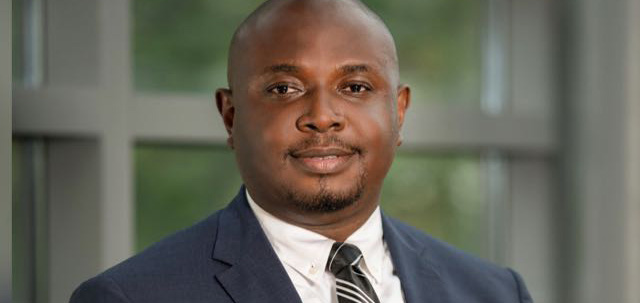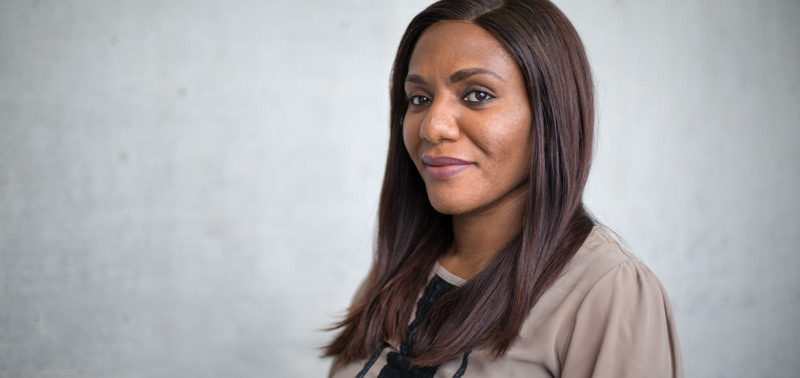When Adepeju Adepoju (MBA ’21), Chantal Chizea (MBA ’21), Philip Ugo Ojiegbu (MBA ’21) and Frank Otabor (MBA ’21), arrived at Rotman in September 2019, they found community with the Rotman African and Caribbean Business Club (RACBC).

Philip Ugo Ojiegbu (MBA ’21)
It’s no surprise all four students committed to serving as executive members for the club when they returned in their second year. From helping Rotman African and Caribbean students secure housing to providing career advice, RACBC is known for providing a supportive space to incoming students. This year’s executive team wanted to pay the support forward.
When the Rotman School expressed its commitment to combatting anti-Black racism last summer, the team knew they had an opportunity to be part of the larger conversation and do more for incoming Black students.
“Our main goal became increasing the number of Black students at Rotman and creating an environment where they can succeed,” says Adepoju, RACBC president.
Though RACBC was initially founded as a cultural club, it has shifted focus towards improving representation and building community at the Rotman School. This year’s executive team has focused on three specific areas: increasing access to opportunities for Black students by raising awareness of the RACBC scholarship fund, building a sense of community through events, and supporting students through mentorship opportunities.
“I think our work is motivated by the idea of ‘Ubuntu’, an African proverb that translates to ‘I am because we are,’” explains Otabor, RACBC’s vice president of events. “In other words, if we don’t work together to reduce barriers or to create access points for Black students to succeed, we all get held back.”
“If we don’t work together to create access points for Black students to succeed, we all get held back.”
—Frank Otabor, MBA ’21
The RACBC Scholarship and improving representation at Rotman
Ultimately, Adepoju and his fellow executives want to see more Black students in Rotman classrooms.

Adepeju Adepoju (MBA ’21)
Over the last few months, they’ve worked hard to grow the recently-launched RACBC Scholarship fund. The fund, which recently received a generous gift from the Laidlaw Foundation, will go towards an annual award that will provide financial support for incoming Black students in the Full-Time MBA program.
Not only will the scholarship support talented students who might lack the necessary funds to pursue their business school education, it will also allow Rotman to bring more diverse perspectives to the classroom to promote robust team experiences for the benefit of students and professors.
“We see our responsibility in maintaining the momentum and developing this fund further,” says Adepoju. “We know that there are many talented Black students who could benefit from the educational and professional opportunities at Rotman. Our hope is that we can eliminate the financial barriers that might prevent them from getting here.”
In addition to speaking with potential sponsors and raising awareness around the significance of this scholarship, the team is engaging prospective students. Earlier this year, in February 2021, RACBC co-hosted the inaugural Future Black Business Leaders Conference. The conference, which was organized with the Rotman Recruitment and Admissions team, included keynote speeches and panel discussions featuring Rotman alumni and Black business leaders, as well as breakout sessions with top companies interested in working with Black talent.
“I see a big part of our work is in growing the Black talent pipeline,” explains Ojiegbu, RACBC’s vice president of communications and finance. “The Black student community is small at Rotman, but it’s promising to know that it’s expanding.”
Building community
Meanwhile, Frank Otabor has focused his efforts on building community through RACBC events. With social distancing restrictions, it’s been a challenging year for creating connection, but he has found success with events that range in size and topic.

Frank Otabor (MBA ’21)
While the club has organized formal career-focused events (on networking, industry nights and inclusion), he’s also organized virtual drop-in sessions so that students can socialize informally.
The motivation behind the events is somewhat personal for Otabor, who still remembers the challenges of relocating from Nigeria to the U.S. to pursue graduate studies more than a decade ago.
“I had to learn a lot of things the hard way. There were times where I faced barriers and discrimination because of the colour of my skin,” he says. “After that, and when I came to Rotman, I made it my mission to make sure that students, especially those who have a similar background to mine and who might be facing the same struggles, would know they weren’t alone and could get help.”
Another recent success was this year’s Culture Eats event, which went virtual for the first time this year. The club’s first-year members organized the event which featured trivia, music and a fashion show. (Attendees were also issued DoorDash codes so that they could order from local African and Caribbean restaurants.)
Otabor just finished planning and executing one of the club’s largest events of the year — the Excellence is Black formal, which highlighted accomplishments of students across U of T, including those from law, medicine and engineering programs.
“This night was about connecting with the wider university community, but also bringing together very talented students with strong expertise,” he says. “I can’t wait to see what synergies and new ideas are sparked from these new relationships.”
Providing access to role models
Chantal Chizea and her RACBC colleagues know that providing access to role models and mentors is key to supporting students in their academic and professional careers. As RACBC’s vice president of alumni relations, most of her efforts from this past year have been focused on expanding Black mentorship programs at Rotman.

Chantal Chizea (MBA ’21)
At the start of the academic year, the club paired first-year students with recent Rotman graduates and second-year RACBC members who could help them navigate business school, including networking, securing internships and tapping into opportunities at the School. Chizea is also working to develop a series of mentorship talks that go over the fundamentals of networking and career development.
Additionally, a few second-year RACBC members offered their time as mentors, as part of the IMANI Tri-mentorship program, where they are mentoring U of T Scarborough undergraduate students who in turn are mentoring high school students in a bid to strengthen the Black student pipeline.
It’s a cause that’s close to her heart, as Chizea recalls her experiences working in engineering, a male-dominated industry, before pursuing business school.
“I have first-hand experience of not only being the only woman, but also the only Black person, in the room,” she explains. “I know the challenges of dealing with bias from coworkers or classmates and the struggles of being heard.”
“The world is big and it’s worth staying open minded to diverse ideas,” she says. “We have talented and qualified students here at Rotman and they have a lot of contribute.”
Written by Rebecca Cheung | More Student Stories »